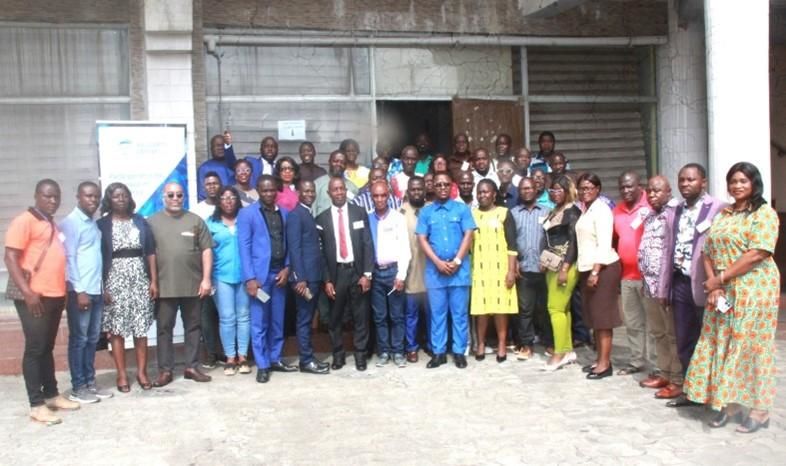Solidarity Center Trains Labor Inspectors, Commissioners And Hearing Officers
In a significant step toward enhancing labor rights enforcement, Solidarity Center has ended a two-day intensive training on gender-based violence (GBV) and workplace discrimination for key officials at Liberia’s Ministry of Labor. The session, which brought together Labor Inspectors,
Commissioners, and Hearing Officers in Monrovia, aimed to deepen participants’ understanding of GBV and discrimination while equipping them with the tools necessary to address these critical issues within the workforce.
The training’s objective was to increase the capacity of Labor Inspectors, Commissioners, and Hearing Officers to adequately address discrimination and GBV in the world of work.
It was also intended to strengthen networks amongst individual communities and institutions to address discrimination.
Solidarity Center manages six offices across Africa and over 20 globally, connecting closely with the global labor movement to promote workers’ rights, says Regional Program Director, Mr. Christopher Johnson.
He made these comments while speaking briefly at the discrimination and gender-based violence capacity-building enhancement workshop, which brought together labor inspectors, commissioners, and hearing officers from all 15 counties of Liberia.
He emphasizes the significance of workers’ rights and critical role of ILO Convention 190.
He expresses solidarity with participants, referring to them as “comrades” and “brothers and sisters.”
Mr. Johnson, who has extensive experience in the labor movement, notes that Solidarity Center operates under the umbrella of the American Federation of Labor and Congress of Industrial Organizations (AFL-CIO), the largest labor organization in the United States.
A focal point of his remark was a need for improved labor management relations and adherence to local labor laws. He notes the transformative impact of ILO Convention 190, which he describes as a consequential milestone from past years.
According to him, Convention 190 extends beyond traditional workplace issues, framing them as essential human rights concerns that affect not only workers but entire communities.
Highlighting a shift in perspective, Johnson points that workplace issues, particularly gender, health and safety, must be viewed holistically, adding “What happens in the workplace is very important… but it is bigger than the workplace.”
He describes the workplace as a primary venue for democracy,
“You spend more time at work than you do casting ballots for elected officials.”
He also reflects on past initiatives, including response to the HIV/AIDS epidemic, which illustrated the intersection of health issues and workplace conditions.
He notes that unfair treatment and dehumanizing conditions in the workplace have lasting effects on workers’ lives outside of their professional environments and commends Liberia for embracing Convention 190 and working to implement it effectively for workers.
“You should really applaud yourselves for being one of the countries that have not only embraced it but created an environment where you ratify it to make it work.”
Deputy Minister for Labor for Manpower, Planning, and Development, Steve S. Kolubah, emphasizes the initiative’s significance for Liberia’s labor sector.
Kolubah expresses pride in the workshop’s realization, stating, “Seeing it happening today is like a dream comes true, especially before the year comes to an end.”
He acknowledges crucial role of participants, reminding them of their importance to both the Ministry of Labor and the wider labor community in Liberia.
“Legally, you are recognized and given the power,” he states and encourages them to embrace their roles with confidence.
Addressing the complexities of the political landscape, he calls on the participants to remain focused on their mission: “We need to know what we want to do, most especially the services we offer to our country”, Minister Kolubah adds.
Meanwhile, the Executive Director for Women NGO’s Secretariat, Mrs. Esther D. Yango, says with the training, there should be a gender focal person at various places of work to address issues surrounding gender.
“We are also working alongside the Ministry of Labor to make sure that Convention 190 is ratified for the good of the country. If women must be safe at workplaces, the government should ratify all the major documents that make women safe”, she underscores.
Deborah K. Davis, Labor Inspector, pledges her commitment to combating marginalization of women, saying “Women and men should be given equal opportunities” in the workplace.
“There should be a broader outreach involving ministers and directors from other sectors,” she urges and adds that the message of Convention 190 must extend beyond the Ministry of Labor into the broader society here.
Margibi Coutny Labor Commissioner, S Roye Brown, joins previous speakers in calling for greater understanding and ratification of Convention 190 by Liberia.
“The psychological impact of discrimination is significant and can hinder productivity,” he cautions.
The workshop concluded with participants expressing gratitude to the Solidarity Center for enhancing their understanding of these critical issues.
The collective hope is that the knowledge gained will lead to real change in the workplace dynamics across the country.
The training initiative was made possible through funding from the Bureau of International Labor Affairs (ILAB) at the U.S. Department of Labor and marks a significant step toward enhancing labor rights and strengthening workers’ abilities to advocate for fair treatment in the workplace.

